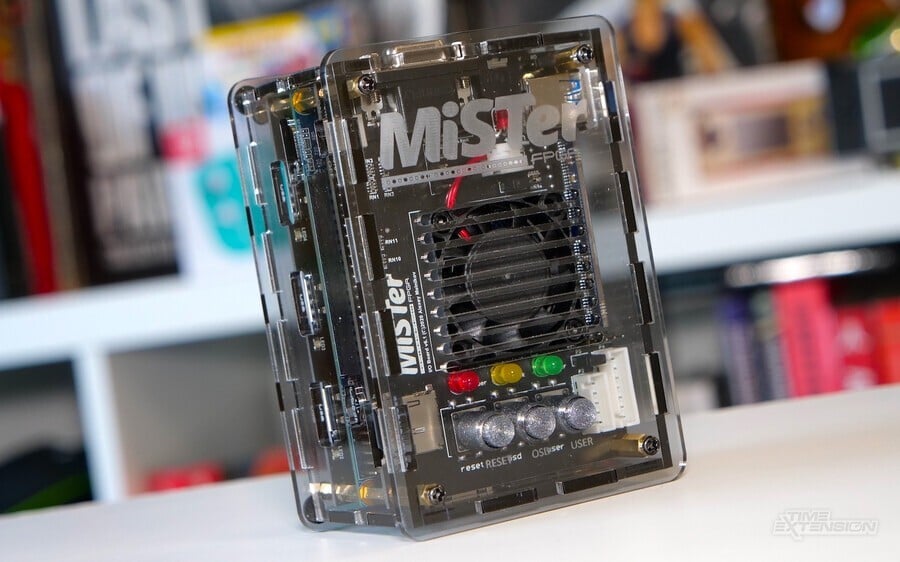
Update: It seems Pixel Cherry Ninja and Pramod Somashekar have now buried the hatchet and have moved on, which is great news:
Original Story [Wed 10th Apr, 2024 13:00 BST]: It's fair to say that Field-Programmable Gate Array chips have revolutionised the way we play retro games in the modern era. FPGA tech allows developers to replicate the performance of vintage platforms on a hardware rather than software level, offering a level of accuracy and faithfulness which is much harder to achieve via "traditional" emulation.
We've seen a flood of systems appear over the past decade which leverage FPGA chips, including the Super Nt, Mega Sg, Analogue Pocket and Analogue Duo – but the one which gets perhaps the most attention from the community is the open-source MiSTer FPGA project, which has been running for quite some time now and is able to replicate systems such as the Saturn, PS1 and N64 thanks to the tireless efforts of an active and passionate pool of developers.
The beauty of FPGA 'cores' is that it's often quite easy to port them between FPGA-based systems, and we've seen developers such as Jotego release new cores on both Analogue Pocket and MiSTer at roughly the same time. However, more recently, the community has begun to splinter, with some key developers turning their backs on MiSTer.
This schism has been demonstrated rather dramatically in a recent public spat between YouTube and FPGA advocate Pixel Cherry Ninja and Pramod Somashekar (@pr4m0d), one of the key FPGA developers behind the hugely promising MARS FPGA project.
According to Somashekar, he has ceased all work on MiSTer FPGA cores due to a disagreement between himself and Pixel Cherry Ninja. Pixel Cherry Ninja, for his part, has acknowledged this and issued an apology, but this appears to have been rejected by Somashekar.
(Since this piece went live, Pixel Cherry Ninja has deleted his apology video and removed a tweet which detailed Somashekar's response.)
Sadly, this kind of episode seems to be common whenever the whole MARS FPGA vs MiSTer FPGA situation is mentioned, with supporters of both platforms seemingly engaged in the tiresome 'console war' mentality that plagues other parts of the industry.
Spearheaded by developer atrac17, MARS is seen by many as the successor to MiSTer; the $700 system was due to be released earlier this year but missed its expected launch date.
With key figures in the retro community like Flxel (a talented developer of 3DO and Dreamcast emulators) and RetroTINK creator Mike Chi, MARS has gained a lot of attention – but not all of it has been positive.
Recently, atrac17 – who had previously approached Time Extension with the view to doing an interview following our coverage of MARS – has begun blocking people on Twitter seemingly without reason (for example, Time Extension has been blocked despite the positive coverage we've afforded the system). We also assume, at this point, that atrac17 won't be answering the questions he requested we send over in October of last year.
A cursory glance at Twitter shows quite a few negative comments relating to the MARS project, and it seems that the delays to the system's release have caused some to doubt its potential – but those close to the project are adamant that everything is proceeding as planned.
For the record, here at Time Extension we're very excited about MARS – any FPGA-powered system which has more advanced hardware inside is naturally going to be of interest to anyone who's keen on retro gaming and game preservation in general. As more potent hardware appears, there's the opportunity to preserve more systems for future generations to enjoy; after all, many retro consoles are operating well beyond their intended lifespans, so accurate replication via FPGA is likely to be the best way to experience consoles like the PS1, 3DO and Dreamcast in the decades to come.
It's just a shame that the launch of MARS comes at a time when the FPGA development community appears to be splintering rather than unifying; a combined community would massively benefit owners of MiSTer, Analogue Pocket and (when it eventually arrives) MARS – and would lay down solid foundations for future FPGA-based systems.
We've contacted the individuals mentioned in this piece and given them a chance to tell their side of the story directly; we will update it if and when we hear back.
In the meantime, if you're invested in the world of FPGA retro gaming, let us know what impact all of this has on you personally – will you shift your allegiance to another system if MiSTer starts getting frozen out? Are you excited about MARS or sceptical? Let us know with a comment below.
